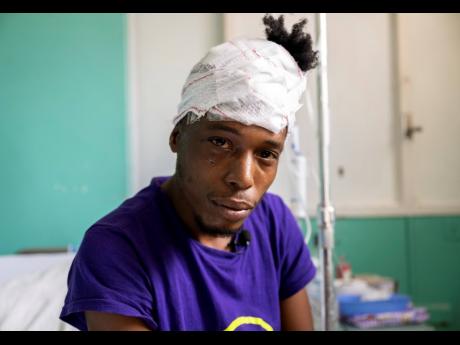Neurosurgery ‘case for the ages’ to highlight CANS 2024 conference
It was an emergency that the University Hospital of the West Indies (UHWI) senior medical professionals called a ‘case for the ages’ that showcased violent trauma at its worst and medical brilliance and miracle survival at its best.
Lamar Nephew was the victim.
Organisers of the annual Caribbean Neuroscience Symposium (CANS), which opens Tuesday, say his case will feature prominently among the medical research that will be shared as one doctors says it was a case of “divine luck”.
The now 33-year-old came to the UHWI from Mandeville Regional Hospital (MRH) with more than three feet of foreign matter extended from his face, with a portion lodged in his skull. It entered just below his left eye. At the time, doctors were not sure of the length of the piece lodged in his skull as MRH had cut about two feet of the length of the spear from the fish gun used to shoot him. On entry, it took the trajectory of a plane taking off, through his skull and brain, stopping a few millimetres from exiting his skull, towards the top and back of his head.
Less than a year later, Nephew is not just alive and well, but only remembers that he had surgery from the itch he sometimes feels at the point of injury in his face.
‘NO ISSUES’
“I feel good, man. No issue at all. It nuh really badda me at all. I leave hospital Mother’s Day last year. I have a headache now, but it nuh have anything to do wid di surgery. Is because ma aunt plait mi hair too tight man. But no issues, no issues,” he told The Gleaner when contacted last week.
So well is his recovery that he has not been back to the hospital for required check-ups and the results of blood tests done last year.
“No sah, nutt’n at all. None a dem deh supp’n,” he said when asked if he had any feelings of illness that could be a result of the injury and surgery.
His medical bill cost taxpayers in excess of $12 million for costs associated with CT scans; CT angiograms; general anaesthesia; digital subtraction angiograms; surgeries – occipital craniotomy, fronto-temporal craniotomy, skull-base approach; post-surgery CT; post-surgery digital subtraction; angiograms; intensive care unit admission for days operating theatre time; three weeks of high-powered antibiotics; pain medication; cutting devices; and disposables for angiograms.
To date, no arrest has been made in the case.
Dr Ronette Goodluck Tyndall, a Fellow of neurosurgery with a cerebrovascular subspecialty – all disorders of the brain affected by blood flow – was one of the receiving neurosurgeons at the UHWI. Last year, she said it was hard to imagine how someone could be that lucky.
“Yes, we are going to present his case at the conference this year … . That case highlights the collaborative efforts of all the teams that were involved and also that we were able to offer advance care, following procedures which caused us to use our specialised training received overseas,” Dr Goodluck Tyndall told The Gleaner.
Nephew’s case will be presented by one of the residents who was involved in his case management.
Among the list of participants for the three-day conference are regional and international medical partners, who are expected to further deepen collaborations, from partnerships that were developed during their specialised training sessions overseas. Presenters will come from Germany, the United States, Canada, Trinidad and Tobago, and The Bahamas.
JAMAICAN PRESENTERS
A number of Jamaicans involved in various types of research will also be presenters.
“It’s literally and ever-changing times in terms of how our healthcare is delivered and trying to always improve on our techniques,” she told The Gleaner, adding that there was a lot of specialised training in Jamaica and that the conference would provide exposure to that training.
CANS begins today with the unveiling of the Leica microscope followed by a workshop on Tuesday. The Leica microscope supports the imaging needs of the scientific community and provides advanced innovations and technical expertise for the visualisation, measurement, and analysis of microstructures.
Of the microscope, Medical Chief of Staff Dr Carl Bruce said, “This is the world’s latest advancement in surgical microscope – augmented reality applied to surgery.”
On Wednesday, there will a Medtronic drill course, and the presentations will begin on Thursday and conclude on Saturday at the Half Moon Hotel in Montego Bay, St James. The presentations will be on more than 20 subjects in various areas of neuroscience.

